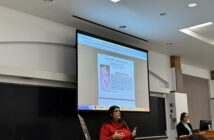
Jake Epstein
Imagine stepping off a Transatlantic flight at Newark, O’Hare or any other major airport in the United States. You collect your carry-on luggage and begin the slow, lethargic walk to the customs checkpoint.
It’s been a long flight, and you’re probably groggy and exhausted. The lines are long, so you groan. Eventually you make it through, collect the rest of your bags and finally head home.
For some people, however, they never make it past the checkpoint.
Since the Trump administration’s installment of the latest travel ban in December, most travelers from Iran, Libya, Yemen, Syria, Somalia, Chad and North Korea, as well as some government officials from Venezuela, are denied entry into the U.S.
Sometimes they’re denied a visa before they leave their home country, but other times they can make it all the way to the U.S. before being denied entry at customs. After a full day or more of traveling, this news could be devastating. Any optimism of coming to the U.S. in an effort to create a better life is crushed.
Though there are some exceptions made on a case-by-case basis, like medical needs, entry into the U.S. is never guaranteed.
I read an article on Reuters that highlighted the case of Maziar Hashemi, a U.S. citizen living in Massachusetts. He was told by doctors in Boston that his best chance of surviving a rare form of blood cancer would require a bone marrow transport.
As it turns out, Hashemi’s brother, Kamiar, is a 100 percent match — a close match between the donor and recipient is required for the procedure. It seemed as if there was hope.
But there is a huge issue.
Kamiar lives in Iran — one of the countries on the travel ban list.
His visa application has been denied by the State Department and is unable to be considered for a waiver. Even if Kamiar tried to get his bone marrow harvested through another country, it would be denied entry into the U.S. because of sanctions on Iranian exports.
While reading this, I found myself upset at the lack of compassion the State Department had for this case.
The story also resonated with me on a deeper level, as I completely empathize with the Hashemi brothers’ frustration.
My grandfather, who lives in the United Kingdom a few miles south of London, has dealt with poor health over the last few years. As he gets older, the odds of him being able to fly seven hours to Boston, where all of his children live and where he can receive top-notch medical attention, have decreased significantly.
When my mother left London to attend an American college, this was not an issue. Now, she keeps her passport with her most places she goes in case she needs to fly to London at a moment’s notice.
Knowing how my mother deals with the worry of having to fly across the ocean for family health reasons, I can’t even imagine a situation where she would be denied entry into the United Kingdom because of a hypothetical travel ban they have on Americans.
While London is still a six-hour flight away, she could land at Heathrow, collect her carry-on baggage, show up to customs and have no issues getting through.
If she was from one of these banned countries, and my grandfather lived here in the U.S., she would have no access to get to him if there was an emergency.
For that reason, the travel ban frightens and disturbs me.
While the rationale behind the ban is to protect our country from terrorism, the most recent attacks on U.S. soil have been caused by U.S. citizens.
The Sept. 11 hijackers were from Saudi Arabia, Lebanon, Egypt and the United Arab Emirates. And while I sat on the subway underneath the city of Boston, two Russian citizens with Chechen ethnicity detonated pressure cookers at the finish line of the marathon.
This travel ban is pointless. Really, any travel ban is, and none of these countries should be included in any variation of it. The answer for fighting terrorism isn’t by banning families, young children or people who could save lives, like Kamiar, from entering our country.
By closing our doors to certain countries for misguided reasons, we only fuel resentment.
Some people will seek entry into the U.S. to create a better life for themselves, their children and their children’s children. They come to be safe, maybe because they are refugees of a broken country, fleeing war or ethnic cleansing.
In the case of Kamiar, he wants the opportunity to save his brother’s life. And they are running out of time. The State Department may take a while to review paperwork and determine who is worth access into the U.S. and takes all the time it needs.
Maziar’s health is declining and there’s no time to wait for bureaucracy.
—
Jake Epstein, ’20, is an associate news editor and columnist for The Brown and White. He can be reached jpe220@lehigh.edu.





Comment policy
Comments posted to The Brown and White website are reviewed by a moderator before being approved. Incendiary speech or harassing language, including comments targeted at individuals, may be deemed unacceptable and not published. Spam and other soliciting will also be declined.
The Brown and White also reserves the right to not publish entirely anonymous comments.
1 Comment
What the US needs to do is what,I believe, Israel does; use profiling. This does not discriminate against countries but does discriminate among individuals based upon perceived threats due to that individual. Not each profile would be accurate but I think your grandfather would always be able to get into the US. The Hashemi brothers’ would undoubtedly have better luck also.